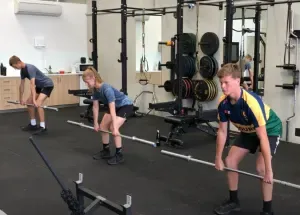
10 Essential Nutrition Tips for Boosting Youth Athletic Performance
Fuelling young athletes for success requires more than just calories—it’s about education, strategy, and adaptability. In our regular Inner Athlete podcast, a seasoned sports nutritionist shared practical advice for parents, coaches, and youth athletes striving to improve performance and long-term health through smarter nutrition. Here are the top takeaways:
1. Treat Nutrition Like Training
Nutrition shouldn’t be a one-time experiment. Just as athletes train their bodies, they must also train their nutrition habits—testing, adjusting, and refining them to discover what works best for their bodies before, during, and after training.
2. Personalized vs Group Nutrition
Working with athletes one-on-one allows for deep personalization based on their sport, position, development stage, and food preferences. In contrast, group sessions focus on foundational principles like balanced plates, fueling timelines, and practical snack ideas.
3. Nutrition Needs Change with Age
Younger athletes typically eat more regularly—often supported by parents—but teens become more independent and vulnerable to misinformation. As they get older, hunger cues change and external influences increase, making guidance even more critical.
4. Combat Information Overload
Teenagers are bombarded by conflicting messages on social media. This leads to “analysis paralysis”, where they’re too overwhelmed to make informed decisions. It’s essential to give them the right amount of evidence-based education—enough to act on, not freeze.
5. Link Nutrition to Performance
Using objective performance testing (like jump tests or speed assessments) helps athletes connect their nutrition habits with tangible results. If performance drops, it's easier to trace it back to hydration, sleep, or what they ate before training.
6. Experiment with Pre-Training Fuel
Athletes often reject pre-training meals after one bad experience. But this is a missed opportunity. Pre-season or low-stakes sessions are the ideal time to trial different pre-training foods and timing strategies to find what fuels performance best.
7. Pre- and Post-Training Snack Ideas
For pre-training (especially 1–2 hours out), combine carbs and protein: think yoghurt with fruit, smoothies with bananas, or tuna with whole-grain crackers. If closer to training, simple carbs like lollies, pikelets with jam, or juice boxes are best. After training, pair protein and carbs again—chocolate milk is a favourite for hydration and recovery.
8. When to Use Sports Drinks
Sports drinks aren’t always necessary—but they’re ideal during long, sweaty, or high-intensity sessions. They provide hydration, carbohydrates, and electrolytes, making them a great option for athletes who struggle to eat before or during training. Avoid sugar-free versions—they lack the energy boost needed.
9. Protein Shakes: A Useful Tool, Not a Meal
Whole foods should always come first, but for busy, multi-sport youth athletes, protein shakes can be a convenient post-training solution. Still, they should supplement—not replace—meals and always be paired with other nutritious foods.
10. Creatine: Safe, But Use With Care
Creatine is one of the most well-researched supplements—even showing promise in brain health and injury recovery. While it’s generally safe, there’s limited research on youth. It should only be considered after consistent, quality nutrition is already in place—and under the guidance of a professional.
To find out more, listen to our full podcast episode:
🎧 Top Tips from a Sports Nutritionist for Enhancing Youth Athletes' Diet and Performance
or 👉 Watch on YouTube
Got questions? Contact our team to see how we can support your child’s athletic journey.
